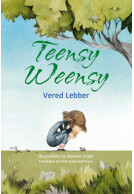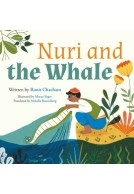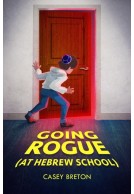Workitu’s Passover (Paperback)
Imprint: Green Bean Books
Pages: 32
Illustrations: Illustrated throughout
ISBN: 9781784388997
Published: 14th February 2024
(click here for international delivery rates)
Need a currency converter? Check XE.com for live rates
| Other formats available | Price |
|---|---|
| Workitu’s Passover eBook (25.8 MB) Add to Basket | £6.99 |
It is another day at Workitu’s village. As usual, she is awoken by the morning sounds of the village. However, for Workitu, something doesn’t feel right. She knows that today, ahead of the Passover celebrations, she will have to break all of the crockery she had become so used to, including her favourite cup, the one she made all by herself. She can’t help but feel that she will be losing something valuable and meaningful to her.
Then, an incident makes her drop the cup she was holding on to the ground, breaking it into pieces. Workitu begins to cry, but then her auntie shares a secret she learned a long time ago, and Workitu is finally able to see this tradition in a new light: “It’s good to break things sometimes. To let go of old things . . . I break, and then I make. All with the same hands.”
With beautiful illustrations throughout, this is a meaningful tale about the importance of letting go of the old to make space for the new, and how family traditions are passed on through generations.
'In this touching, folk-like tale, Workitu, a young Ethiopian Jewish girl, discovers that her family’s Passover ritual of smashing their hand-made clay dishes, including her favorite cup, is a meaningful tradition of transforming the old into something new. Eden Spivak’s illustrations depict the warmth of rural village life..’
Penny Schwartz, Jewish Press of Tampa Bay
Rating: 5 out of 5 stars
NetGalley, Dione Basseri
Ethiopia has one of the longest continuously practicing Jewish communities in the world, dating back to the 4th century CE. Being so old and so distant from other major Jewish communities, Ethiopian Jews have their own particular traditions, and one is explored here.
The day before Passover, Workitu and her sister must smash all of their family’s crockery, including Workitu’s favorite cup. Workitu is distraught over her loss, until she learns that all the clay is softened and worked into the plates, cups, and other tools that will be used for the following year, allowing her to keep her cup, but in a new form.
This story is less about religion, and more about emotions, family, and tradition. It is a celebration of unique heritage, and one that we really don’t see much in picture books.
'In this charming and lovingly illustrated tale of a Jewish Ethiopian family, a young girl, Workitu, learns about her family’s Passover custom of breaking their dishes to be certain every trace of chametz is destroyed. Workitu cherishes certain pieces of the family pottery and can’t understand why the beautiful, graceful vessels should be shattered each year and then ground into powder.
Arlene Schenker, SydneyTaylorSchmooze.com
Nevertheless, Workitu follows her mother’s instructions, and along with her little sister Almaz, carries the pottery to her nearby Auntie Balainesh’s where the shattering and grinding is to be done. Auntie Balainesh patiently explains that the old must make room for the new, and Workitu allows Auntie to teach her to mix the powder from the broken vessels with clay, to knead it and create new vessels. When Workitu realizes that the family’s dishes were made over at each Passover through the generations, she comes to appreciate the tradition and learns that sometimes you have to say goodbye to treasured things. She is proud of the new oil jug she fashioned out of her favorite cup and pot, and is ready to enjoy all the new pottery the next day at Passover.
I love the lyrical text by Zahava Workitu Goshen and the neutral tones (except for some small splashes of color) in the artwork by Eden Spivak. The Jewish content is strong and the book gives American children a wonderful opportunity to learn about an ancient Jewish Ethiopian tradition still carried on today. But you certainly need not be Jewish to enjoy this story and empathize with Workitu. There is a full recounting of the Passover story in the front of the book’.
'In this touching, folk-like tale, Workitu, a young Ethiopian Jewish girl, discovers that her family’s Passover ritual of smashing their hand-made clay dishes, including her favorite cup, is a meaningful tradition of transforming the old into something new. Eden Spivak’s illustrations depict the warmth of rural village life.’
Jewish Telegraph Agency
Rating: 5 out of 5 stars
NetGalley, Kate Morgan
This is a wonderful book about Passover. I loved the perspective of Workitu and this history and meaning behind breaking dishes before Passover. Wonderful book and I would use this in my classroom.
Rating: 5 out of 5 stars
NetGalley, Jan Tangen
What do you know about the cultural practices of Jews who come from Ethiopia? One practice is to break all of the clay pots and other vessels, crush them into dust, mix them with some new clay and form them into new, then decorate and fire them in the kiln just before Passover. All things old are new again!
Translated into English by Jessica Bonn.
The illustrations by Eden Spivak are delightful, imaginative, clear, and colorful.
Well suited for reading WITH someone of any age including ESL, and great for gifting to anyone, and even to a school or teacher or your public library!
This story follows Workitu, a girl in Ethopia, as she gets ready to celebrate Passover.
NetGalley, Sara Allison
It introduces the customs of the Jews of Ethiopia, the tradition of breaking old pots to make room for the new. When the new pots were ready, Passover would be here.
"We must break old things to make room for new"
6 year old approved!
Rating: 5 out of 5 stars
NetGalley, Donna Maguire
I thought that this book was excellent and I loved the story.
I read the book with my 6 year old daughter and I loved the way that the book was written and how well it was all put together, we used the book to talk about different counties and cultures. She is learning more about these at school so this was great for us to be able to chat around it and help her learning at home too.
She was able to read the book to me (with a bit of help on a couple of tricky words) and really enjoyed it from start to finish. The story was easy for her to follow and it was a great way for us to spend some time together – we do love our reading time and she takes after me with her massive love of books!
The illustrations were perfect for the book and really brought the story to life.
It is 5 stars from me for this one – very highly recommended!
Rating: 5 out of 5 stars
NetGalley, Julie Ditton
“Workitu’s Passover” tells the tale of a young girl as she prepares for Passover in her small Jewish community in Ethiopia. This story centers on the themes of tradition and the importance of family, renewal, and of remaking the old into the new. Workitu is upset because it is the custom in her village to break all the clay dishware every year and make new dishes. She does not want to give up her favorite dishes that her mother made. It is only when she helps her aunt make new ones, that she learns the old dishes are ground to powder and mixed into the clay for the new dishes. Then she can appreciate that in remaking the dishes, they are handed down through the generations and all her family are honored.
The book is based on the childhood memories of the author, Zahava Workitu Goshen, who emigrated from Ethiopia to Israel. The Beta Israel Jewish community lived in Ethiopia and were isolated from mainstream Jewish communities for millennia. They maintained some unique traditions; the recycling of Passover dishes to and from the earth is this story's focus.
There has been a push for multicultural children’s books in recent years, so that children can see themselves in the books that they read. This charming story is a perfect example of multicultural representation of the Jewish diaspora. Most Jewish children’s literature depicts white Ashkenazic Jews of European decent. It is important for children to see that there are Jews of all colors from all over the world.
Jewish children will enjoy reading a different type of Passover story. But any child can appreciate the themes presented. However, this book does assume that the reader has some basic knowledge about Passover. During Passover, it is traditional to eat unleavened bread to recall the fact that during the Exodus from Egypt there was not enough time to let dough rise. In Preparation for Passover, people may rid their home of any crumb of chametz or leavened bread. In most homes throughout the world, that would simply entail a thorough cleaning of the kitchen. Readers should realize that this story presents a unique custom.
I read a temporary e-book from Green Been Books. However, I can honestly recommend this book to any youngster. Children reading about this unique tradition will hear a story of love and honoring one's elders. Parents or teachers might use this story for discussion of Passover, Ethiopian culture, honoring one’s elders, or recycling.
Rating: 5 out of 5 stars
NetGalley, Lisa Davidson
This was new to me but what a beautiful way to celebrate! Breaking the things from last year, remaking them, and knowing that you're part of an ongoing tradition with the family you love.
I really enjoyed this children's book about Passover traditions in Gondar, Ethiopia. Beautiful illustrations and I learned a lot in a short time. This book will be interesting for children and adults who want to know more about Ethiopian Jews and their culture. The traditions with breaking and remaking pottery reminded me of the Japanese art of kintsugi.
NetGalley, Elizabeth Norman
About Zahava Workitu Goshen
Zahava Workitu Goshen was born in Ethiopia at 1976. She made Aliya to Israel in 1984. Zahava lives in Beit Shemesh with her family. She works at the welfare department and is a graduate with a major in education and parental guidance.
About Maayan Ben Hagai
Maayan Ben Hagai was born in Kibbutz Degania Bet in 1970. Maayan is a social worker and she owns a bookstore in a mobile truck, Astronautit, which she takes to various communities on the weekends. She lives in Jerusalem with her three daughters. Maayan has published two novels, short stories and a book for youth, Gudai, which she wrote with Zahava Workitu Goshen.
About Eden Spivak
Eden Spivak is a children’s book and editorial illustrator, with a BA in visual communication from the Bezalel Academy of Arts and Design, Jerusalem. She is also a design writer and editor. She enjoys working at the intersection of text and image, putting visual concepts into words, and dreaming up imagery to accompany written text.














